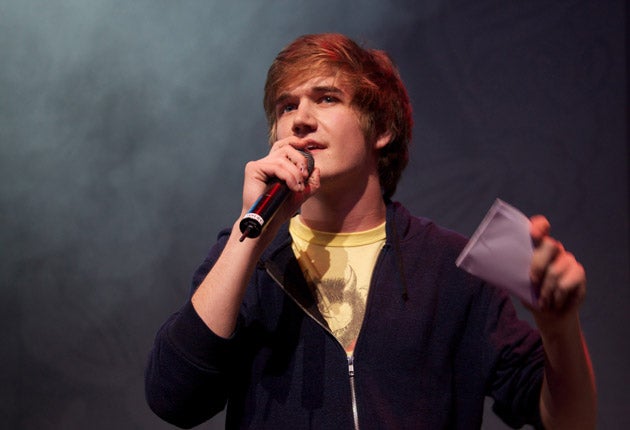Comedy albums are no laughing matter
From Bo Burnham to Harry Hill, stand-ups are rediscovering the joys and profits of the long-player, says Julian Hall

Next to the massive market for comedy DVDs, the concept of a comedy album seems almost quaint. But a spate of recent releases shows that a journey into sound is still an option.
Harry Hill, Tim Minchin and Tim Key have all cut CDs recently, while American comedians including last year's Edinburgh Fringe phenomenon, Bo Burnham, and Ricky Gervais' pal Louis CK have also entered the recording studio.
Today's comedians are quick to pay homage to the importance of audio. Their loss of innocence, it seems, was not just based on VHS copies of Eddie Murphy's Raw and Delirious being passed around the playground (which apparently set Michael McIntyre on the path to stardom). Peter Sellers, Pete and Dud's Derek and Clive, Not the Nine O'Clock News, Monty Python and the American giants Robin Williams and Steve Martin all released top-selling comedy LPs.
"Don't forget Alexei Sayle's single, 'Ullo John! Got A New Motor?'", the comedian Robin Ince reminds me, when we sit down to talk about the discs that defined his youth. Ince also mentions National Lampoon and George Carlin as divine vinyl moments, and adds: "It's better listening to Lenny Bruce than watching him."
The fortunes of the comedy album waned in the 1980s before the genre was revived partly thanks to the re-release of two albums by Bill Hicks, Dangerous and Relentless, in the 1990s. I wore those two cassettes out; tapes of Ben Elton, Eddie Izzard and Mark Lamarr, whom I first heard on a bootlegged recording of a university comedy night, suffered the same fate.
With the advent of DVD, many British comedy albums ended up in the bargain bins before iTunes and other outlets made them viable again. According to Jack Vaughn, the head of Comedy Central records and the man responsible for a string of new releases including those from Burnham and Louis CK, the American CD market is now broadly equal to the DVD market, thanks to the country's "driving culture".
The rise of musical comedy has also played a part with Minchin, a self-styled comedy rock star, spearheading the revival. His 2009 live album, Ready For This, was recorded at London's Queen Elizabeth Hall and includes "White Wine in the Sun" and "Storm", massive YouTube hits before he decided to commit them to CD.
Harry Hill's recent Funny Times, is a more surprising release. Rather than simply recording a set, he cut some novelty songs. There are some pleasantly silly tracks such as "Ken!" on which the Coronation Street star William Roache sings about his character, Ken Barlow, in the style of Jimmy Dean's "Big Bad John". Elsewhere John Craven and Bruce Forsyth pop up to lend a hand on an album that captures Hill's ability to be both silly and sinister. On "Phone Up Yer Mum", he sings: "Dad's OK/ He doesn't need a call/ He's happy sitting in his shed/ Be a good son and phone up yer mum/ Because one day she'll be dead."
Burnham's Words, Words, Words requires repeated playing, thanks to his clever lyrics. It helps that his backing tracks are competent takes on hip-hop that propel his messages on sexism and racism. This is no novelty record.
Another Edinburgh award winner, Tim Key, has taken a characteristically, well, low-key approach, setting his poems to soporific music on Tim Key. With A String Quartet. On A Boat. Key delivers his deadpan ditties around a sub-plot that features his collaborator Tom Basden and the string quartet. As Simon Pearce, of Key's producers, The Invisible Dot, says: "Doing a DVD isn't as good as doing something tailor-made."
While many artists have turned to podcasts for tailor-made off-shoots, they are a more topical and disposable medium than the record. As such they may have helped to turn the tide back to albums. "From the album and radio to the podcast and back again," says Ince. "It's the cyclical effect of modern technology at play."
"Right round, like a record, right round," you might say.
Join our commenting forum
Join thought-provoking conversations, follow other Independent readers and see their replies
Comments